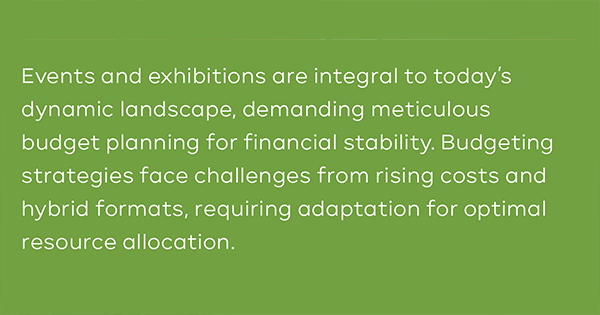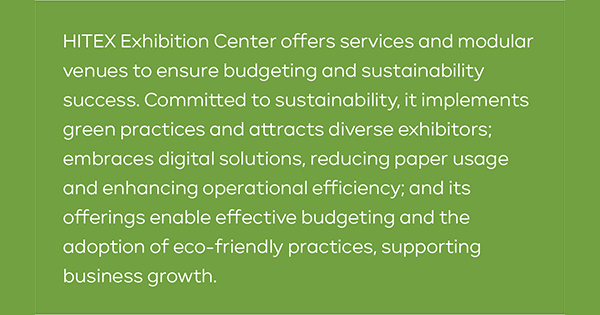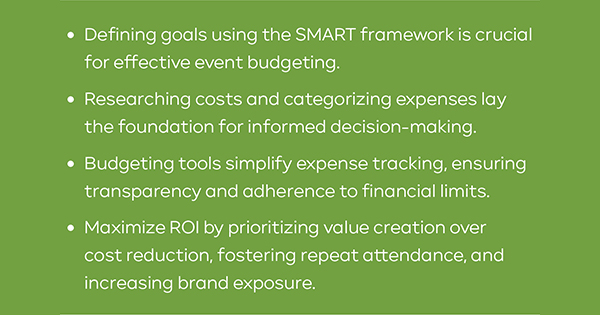A Penny Saved is Two Pennies Earned

COVER STORY
Events and exhibitions have become an integral part of today’s ever-changing world, where we see major initiatives such as ‘Vision India@2047’ and widespread implementation of globalization. In this current dynamic events and exhibition industry, meticulous budget planning is a Must, to stay afloat and successful.
The events market in India is projected to grow significantly, reaching US$ 8.71 billion by 2028, highlighting the sector’s importance. Marking sincere attention from the Government, the initiatives in place act as an enabler for cleaner transition, creating green jobs, and promoting sustainable development, as well as underscoring the importance of budgeting in this sector.
HITEX’s commitment to excellence and cost-effective solutions makes it a trusted partner in the events and exhibitions industry, facilitating stakeholders to accomplish their objectives effectively and in a sustainable manner.
The process of creating a Best-Practice Budget is the first step towards achieving financial success. Following steps serve as a guide book:
Defining Goals
Setting an initial, well-described event objective is the key to the event’s success. Through the process of goal-setting, event planners can match their budget allocation to desired results, thus ensuring their financial resources are indeed utilized efficiently. To determine event goals, a structured approach like the SMART framework is essential, which stands for Specific, Measurable, Attainable, Relevant, and Time-bound. Including the SMART framework into the decision-making process ensures the efficiency of budgeting.
Equally important is to maintain flexibility while planning events to meet unforeseen contingencies. Reviewing previous event budgets gives an idea of the areas where money was misspent and leaves room for optimization possibilities. Splitting the budget for each event into categories and tracking expenses brings forward transparency and logical/informed decision-making. The backbone of strategic event planning lies in drawing up a framework of objectives based on the SMART approach, drawing from the best lessons of past events, and keeping the budget as flexible as possible.
Research & Categorize
Before diving into budgeting, thorough research and categorization are key, as these initial steps set the stage for informed decision-making, ensuring that the event stays on budget while maximizing its impact.
Researching Costs - A realistic event budget requires extensive study of numerous expenditures, such as,
Venue Rentals: comparing bids based on space, location, amenities, and catering.
Equipment Rentals: researching audio-visual gear, lighting, booths, staging, and furniture rental prices from several providers.
Marketing and Promotion: costing online ads, social media, email marketing, print materials.
Onsite Staffing: estimating setup, registration, security, and logistics labor expenses.
Food & Beverage: considering catering packages or self-catering.
Permits and Insurance: getting permit rates and event insurance for emergencies.
Cost Categorization - Post research data compilation, categorization of the expenses into meaningful groups is the next step, which includes Venue Costs, Marketing & Promotion, Operational Costs, Technology & Supplies, and Miscellaneous Costs. Segmenting expenses provides clarity and helps to identify areas for cost-saving measures.
Budgeting Tools – Utilizing budgeting tools and software applications to input estimates, visualize spending breakdowns, track actual expenses, and compare scenarios. These tools simplify the process, ensuring transparency and adherence to financial limits.
Maximize ROI
Generating the highest return on investment (ROI) is the most important goal. Though cost optimization is a good thing, the way to do that is to offer stakeholders—the attendees, exhibitors, and sponsors—more value in terms of intangible yardsticks.
A look at the primary steps to move beyond cost reduction and craft a budget that yields exceptional ROI.
Reorienting Focus - Prioritizing value creation is more necessary than cost reduction. It is important to ensure repeat attendance of attendees, provide a conducive environment for networking and brand exposure to exhibitors, and provide extensive brand visibility and audience engagement
for sponsors.
Strategic Cost-Effective Measures - Efficiency sans compromise—can streamline expenses without jeopardizing quality. Technological integration, partnering with sponsors/organizations to share resources or co-locate and co-host events, and out-of-the-box innovative approaches are some of the proven methods.
Strategic Investments - It includes interactive features boosting engagement, speaker selection, and data-driven insights.
Monitor & Adapt
Beyond initial preparation, an efficient event budget involves ongoing monitoring and adaptation throughout the event lifespan to ensure budgetary restrictions and allow quick modifications.
Expense Tracking: Establishing a robust system for tracking all event-related expenses and meticulously recording each cost to maintain transparency and identify budget deviations, fosters accountability, uncovers optimization opportunities, and informs future budgeting decisions.
Budgeting Tools and Spreadsheets: Dedicated budgeting tools or well-maintained spreadsheets simplify expense tracking with real-time updates, comparative analysis reports, and data export, allowing organizers to make informed decisions and optimize budget allocations.
Adapting Budgets: Event planners must identify savings opportunities, renegotiate contracts, and prioritize spending to maximize resource utilization and capitalize on unforeseen opportunities to increase event ROI.
In sync with the trends
Embracing Technology and Hybrid Formats, Integrating registration software, email marketing, and virtual platforms helps to streamline processes and enhance attendee experiences while cutting costs. Seeking guidance from event budgeting experts and professionals also facilitates to develop robust budgets and uncovering cost-saving opportunities. Organizers can elevate event success while maintaining financial efficiency by implementing these strategies.
Walk the Talk
HITEX Exhibition Center offers a range of services to event planners and exhibitors to ensure budgeting and sustainability success. With a variety of trade shows known for their expertise and service quality, it provides a modular venue that allows customization according to specific needs—allowing room for organizers and planners to choose from varied options and make effective budget alterations.
Committed to sustainability, HITEX implements green practices such as energy efficiency, waste management, and sustainable materials, which is in line with the government’s COP27 and NDC commitments. It attracts diverse exhibitors, fostering networking and knowledge exchange. Supported by the Government of India and Telangana, the venue promotes sustainable waste management. Through partnerships with various organizations, it facilitates connections with relevant stakeholders.
On top of that, HITEX embraces digital solutions, which reduce paper usage and enhance operational efficiency. These offerings enable event planners and exhibitors to budget effectively and adopt eco-friendly practices, supporting the growth of their businesses.
Events and exhibitions are integral to today’s dynamic landscape, demanding meticulous budget planning for financial stability. Budgeting strategies face challenges from rising costs and hybrid formats, requiring adaptation for optimal resource allocation.
HITEX Exhibition Center offers services and modular venues to ensure budgeting and sustainability success. Committed to sustainability, it implements green practices and attracts diverse exhibitors; embraces digital solutions, reducing paper usage and enhancing operational efficiency; and its offerings enable effective budgeting and the adoption of eco-friendly practices, supporting business growth.
• Defining goals using the SMART framework is crucial for effective event budgeting.
• Researching costs and categorizing expenses lay the foundation for informed decision-making.
• Budgeting tools simplify expense tracking, ensuring transparency and adherence to financial limits.
• Maximize ROI by prioritizing value creation over cost reduction, fostering repeat attendance, and increasing brand exposure.



